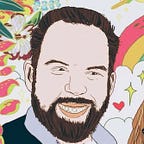Radical Diaspora, My Family, and Bernie Sanders
Progressive Jews Have a Duty to Recall Our Past to Be In Solidarity With Others, and Bernie Sanders is Leading by Example
Growing up as a secular Jew, my family’s past was always shrouded in mystery
What kind of name is that? I’ve never heard anything like it.” My responses varied, depending on how much I felt like addressing my Jewish roots. Sometimes I said “Russian,” sometimes “Ukrainian,” sometimes I would throw a wrench in the conversation and emulate my sarcastic father and claim it was Filipino (it’s not).
A lot of the time, explaining my Yiddish roots was more trouble than it was worth. As a patrilineal half-Jew, it always seemed like well meaning goyim would love to try to show their knowledge of olde Judaica by asking if my mother or father was Jewish. This inevitably lead to friends and co-workers proclaiming “oh, so you’re not a real Jew.” It was always great to have my familial culture and identity crushed by someone who wouldn’t know the Torah from the Talmud or, more importantly to me as an 11 year old, Mel Brooks from Mel Blanc.
My grandfather’s people emigrated from what is now the nation of Belarus. Throughout the late medieval and early modern period, this lands of Belarus, Lithuania, and Poland were home to millions of Yiddish speaking Jews like my ancestors. While things were never great for Eastern European Jewry, they survived cold winters as intermediaries for trade. Due to tight regulations by the state of the Polish-Lithuanian commonwealth, Jews were barred from living and working in agricultural communities and other professions. These regulations kept us socially isolated and economically dependent on the unstable market for trade.
The hyper antisemitic Russian Empire replaced Polish Lithuanian rule over the region known as the “Pale of Settlement.” The Czar looked to rid his empire of those who did not follow Orthodox Christianity, forcing Jews to relocate to these lands. It was in these shtetls that the revolutionary spirit of Eastern European Jewry was born.
Between the Czar’s pogroms and the barbarism of the Nazi regime, this region went from the largest concentration of Jews in the world to a Jewish community that barely reached 20,000. The lucky ones, like my great grandparents gained passage out of Europe to the comparatively safe United States in the 1910s. Many others did not make it, including family members whose names I will never know.
One name we do know, though, is Eli Sanders, the father of Senator Bernie Sanders. Living in Poland as the 3rd Reich marched east, he was able to take a similar journey my great grandparents took, escaping the brutality of Nazism to make it to New York City. He was 17 without a nickel in his pocket, armed with only his wits and a Yiddish accent. As noted in the Senator’s powerful speech in Brooklyn on March 2, 2019, no one else made it out of the war alive.
In that speech, Bernie Sanders opened up about his life story and roots. He spoke of his childhood living in a three-bedroom rent controlled apartment in Brooklyn, where his father Eli worked as a paint salesman. When his mother died in his childhood, Eli was all Bernie had. Eli had lost so much due to militarism and anti-semitism, but he instilled a sense of possibility and radical hope into Bernie and his brother Larry , who himself is active in UK politics.
As Jewish American identity changes through reform movements, intermarriage, and a growingly frayed relationship with Zionism, this presidential campaign is a chance for progressive Jews to use our unique experiences to empower social change. In less than a century, Ashkenazi Jews have gone from outcasts to curiosity to full blooded “white” Americans.
In that transition, many of our family members shed their radical leftist politics, but we can never shed our history. As a people who have been routinely oppressed through capital and state violence, we should not shy away from invoking this trans generational trauma that haunts many of us to this day. Instead, we should take take the lead of people like Bernie Sanders, and look to be informed by our history to fight the battles of today. Instead of cowering with fear or falling into hard right Zionism, American Jews can find commonality among the many oppressed and disempowered people across the world. With this we can turn our world from atomized families to a greater radical diaspora that looks to find power in our pain, and unity in our difference.
Unity means standing by people like Ilhan Omar, a woman with more in common with my family than establishment Jewish media figures like Batya Ungar-Sargon would like to portray. Fleeing Somalia as a refugee and religious minority, Omar’s family story is a lot more like ours than her detractors would like us to believe.
And yes, finding power in our pain means listening to and trusting someone like Bernie Sanders. Despite all the criticisms one can have of him, he knows this history and has applied it not just within the Jewish community, but as a force to inform his activism and political movement. There are few people of prominence in American politics with their roots so firmly planted in the worldview of the radical diaspora, not looking to emphasize individual identity, but a collective struggle. As a people pushed to the edges of society for hundreds of years, this perspective is more vital than ever.
Ben Udashen is a writer, childcare worker, and podcaster based in Seattle, WA. You can follow him on Twitter at @benudashen, listen to his podcast Unpopular Front, and follow Unpopular Front on Facebook.
